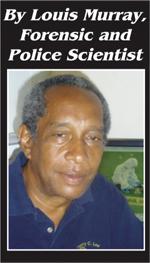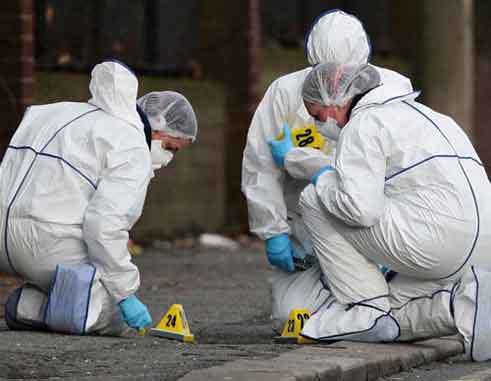 IT is unfortunate and of major concern when our new forensic laboratory has had to close its doors, after just five years in existence and still in its infancy. But mired in a range and series of concerns and issues relating to management, operations and staffing over the past two to three years, such would have been inevitable as even the recent events which precipitated its closure are, to me, inextricably linked to all the other issues.
IT is unfortunate and of major concern when our new forensic laboratory has had to close its doors, after just five years in existence and still in its infancy. But mired in a range and series of concerns and issues relating to management, operations and staffing over the past two to three years, such would have been inevitable as even the recent events which precipitated its closure are, to me, inextricably linked to all the other issues.
I have on many occasions expressed serious concerns about the laboratory for which its responsible Ministry of Legal Affairs failed to pick up on. With my long exposure to forensics it is unimaginable that a high level security facility of such scientific and legal importance could have been running under the circumstances and conditions which ours has been and for so long.
Dr. Stephen King, pathologist and a player in our forensic service, suggests that the laboratory needs to chart a new course in the form of a private public partnership and adds that this is no time for playing the blame game. Whilst I agree there will definitely have to be a major change moving forward, we must however, take the necessary time to recognize and appreciate all of what went wrong and why it did, so as to best guide in the way ahead and that should be relatively easy.
Our former forensic laboratory service also collapsed in 2005 and it is the then absence of any interest, analysis or post mortem and lessons derived that likely resulted in that repeat shutdown today. Consequently we cannot yet again just drift on without a prudent and comprehensive assessment.
While it is not my intention to rehash on my comments of the past I will instead look at some important points and consequences for our justice system.
1. The whole purpose for having our new forensic laboratory was to give law enforcement the benefit of having an improved and more sophisticated forensic service and to get results in a timely manner. The laboratory was mandated to provide services in seven areas of forensic work for which it is well equipped. Conducting investigative forensics work would mean two things. Investigators would hopefully and in quick time be able to obtain early scientific intelligence as to the possible direction(s) their investigations could take and also in reasonable time get information towards suspected scenarios and an early exclusion or initial inclusion of a suspect in a matter. An early exclusion would allow investigators to quickly refocus on another suspect or direction. The whole investigative process should then flow more accurately and speedily.
2. The absence of laboratory resources for investigative forensics over the past few years eliminated the aspect of scientific intelligence and almost similarly the ability of investigators to receive early and continuing examination results so as to properly develop or construct a scientific approach to their case management.
3. All of points 1 and 2 would have severely hampered, and in the majority of situations stopped the progress of cases relying on scientific evidence, consequently resulting in untested and unmanaged laboratory case work and invariably serious case work back logs. Annual laboratory performance statistics should easily shed light on that.
4. The reality of the closure of the laboratory will invariably also dampen the enthusiasm, commitment and consequently performance, of our crime scene officers due to frustrations as to what exactly is going on and the outcome of their work of collecting crime scene exhibits.
5. Also, since serious crimes continue to be committed with regularity a pertinent question is what will happen to current, ongoing and future case work in so far as laboratory custody management for evidence collected, especially those requiring special storage conditions?
6. If there is need to have urgent case work attended to then the high costs of overseas forensic referrals will be a difficult pill for taxpayers, conscious of the massive investment in a facility currently unused. Further, even in its dormancy, just its daily ticking over incurs expenses.
7. Prior non use of much of the laboratory’s instrumentation and its consequent down time now made even worse through closure, may affect the operational status of such sensitive equipment sufficient to result in a maintenance factor. That would incur costs resulting from checks and servicing required and possible replacement of critical parts where necessary.
No forensic service should contribute an injustice to a justice system and so the government can no longer delay the inevitable. Proper and informed decision making will be needed as to the laboratory’s future as it is clear that its parent ministry alone is not up to the challenge. In whatever form the laboratory moves forward, its operators will have to recognize both the gravity of the situation and the time the laboratory will be out of commission. That time will be determined by two major aspects of equal importance. One is the need for a comprehensive investigation so as to successfully effect damage control alongside the total rectification of all of the issues and flaws. There must be total transparency there. The other will be the need to secure all of what’s necessary to bring the facility to its full operational potential for which it is already excellently equipped and for which our justice system awaits. Make no mistake, confidence in and credibility of the laboratory, now tarnished, will have to be priority Nos. 1, 2 and 3.
There will not be another chance and so prudence dictates there must not be any rush just to show that the laboratory is allright and open for business unless all corrective measures have been properly conducted and all requirements are in place for future operations. That must be done to satisfy the minds of players and observers in the scientific and legal communities, prospective, especially regional clients and even the general public that the laboratory is indeed ready.














Well Mr Prime Minister, do you have any light to shed on this situation?